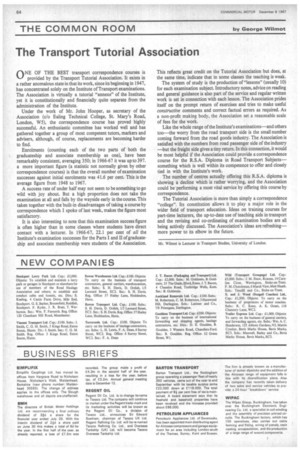The Transport Tutorial Association
Page 66

If you've noticed an error in this article please click here to report it so we can fix it.
ONE OF THE BEST transport correspondence courses is provided by the Transport Tutorial Association. It exists in a rather anomalous state in that its work, since its beginning in 1947, has concentrated solely on the Institute of Transport examinations. The Association is virtually a tutorial "annexe" of the Institute, yet it is constitutionally and financially quite separate from the administration of the Institute.
Under the work of Mr. John Hooper, as secretary of the Association (do Ealing Technical College, St. Mary's Road, London, W5), the correspondence course has proved highly successful. An enthusiastic committee has worked well and has gathered together a group of most competent tutors, markers and advisers, although, of course, replacements are becoming harder to find.
Enrolments (counting each of the two parts of both the graduateship and associate membership as one), have been remarkably consistent, averaging 350; in 1966-67 it was up to 397. a more important figure (a statistic not normally given by other correspondence courses) is that the overall number of examination successes against initial enrolments was 41.6 per cent. This is the average figure from 1948 to 1967.
A success rate of under half may not seem to be something to go wild with joy about. But a high proportion does not take the examination at all and falls by the wayside early in the course. This taken together with thebuilt-in disadvantages of taking a course by correspondence which I spoke of last week, makes the figure most satisfactory.
It is also interesting to note that this examination success figure is often higher than in some classes where students have direct contact with a lecturer. In 1966-67, 22.1 per cent of all the Institute's examination successes for the Parts I and II of graduateship and associate membership were students of the Association. This reflects great credit on the Tutorial Association but does, at the same time, indicate that in some classes the teaching is weak.
The system of study is the production of "lessons" (usually 10) for each examination subject. Introductory notes, advice on reading and general guidance is also part of the service and regular written work is set in connection with each lesson. The Association prides itself on the prompt return of exercises and tries to make useful constructive comments and correct factual errors as required. As a non-profit making body, the Association set a reasonable scale of fees for the work.
Like the whole range of the Institute's examinations—and others too—the worry from the road transport side is the small number coming forward from the road goods industry. The Association is satisfied with the numbers from road passenger side of the industry —but the freight side gives a tiny return. In this connection, it would be most helpful if the Association could provide a correspondence course for the R.S.A. Diploma in Road Transport Subjects— something which is well within its competence to offer and closely tied in with the Institute's work.
The number of centres actually offering this R.S.A. diploma is showing a decline which is rather worrying, and the Association could be performing a most vital service by offering this course by correspondence.
The Tutorial Association is more than simply a correspondence "college". Its constitution allows it to play a major role in the wider field of transport education. Ideas on training courses for part-time lecturers, the up-to-date use of teaching aids in transport and the revising and co-ordinating of examination bodies are all being actively discussed. The Association's ideas are refreshing— more power to its elbow in the future.
Mr. Wilmot is Lecturer in Transport Studies, University of London.








































































































